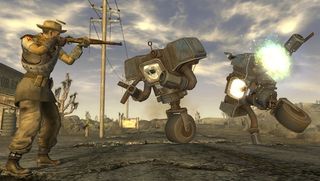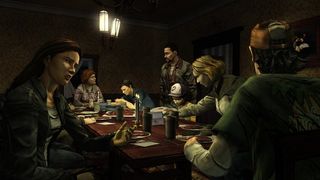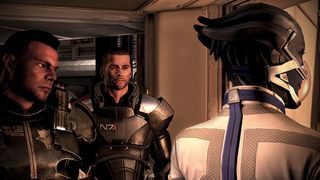How much control do we really have over video games?
“Play your own way!” boasts the back of the box. “Unprecedented levels of player control!” screams the press-release. It seems we live in a gaming age where the person holding the controller is King (or Queen), and that we are in total control of everything that happens on screen. Well, to an extent, that’s true--if I don’t press the buttons on my PS4 pad, Willow will definitely starve in Don't Starve--but I’m noticing more and more that some of that control is an illusion, and we may not have the wonderful array of choices as advertised.

In particular, I’m thinking of a moment I recently experienced while playing NBA 2K14’s rather brilliant My Career mode. The PS4 (and Xbox One) versions of My Career have a full-on story that runs through the career mode, which throws up all kinds of ‘random’ events and amusing cut-scenes. Now, I don’t doubt that many of the scenes are set to trigger at certain times to help tell a story. You get your first chance in the NBA, for example, when a player on your team gets injured about 3 games into the regular season. It’s an event that happens every time, and you have no control over it. It’s a story beat.
However, the whole premise of NBA 2K14’s My Career mode is that you are the master of your own destiny: you determine the rise to stardom of your created player. Several weeks after my first NBA game, and I’m getting good minutes as Sixth man. Not only that, I’m out-scoring (and getting good defensive and assist stats) everyone else on the team. Yet for some reason, neither the coach or general manager think I’m good enough to start. In fact, the starting position I’m vying for is actually given to a nobody on my team, when the regular starter gets injured. WHAT DO I HAVE TO DO TO GET INTO THAT STARTING SHOOTING GUARD ROLE?

Turns out, all I need to do is wait. I wait patiently, get my first start against Miami, and have an average game. Not my best, but ok. However, after the game LeBron finds me in the player tunnel, and we have a good old chat about the pressure of being a starter in the NBA, and how he enjoyed playing against me in my first game. Don’t worry, I’m getting to my point here. Fact is, this scene is pre-set--I know that, because they specifically captured LeBron’s voice for it (most players are not voice-captured, and few appear in cut-scenes)--and I’m pretty sure that I’d have seen it no matter how I’d been playing for the last 10-or-so hours.
Why? Because the game has story beats to hit, and it wants to make me feel special. I’m damn sure that my player was specifically kept out of the starting line up until the Miami game, so LeBron could pop over and tell me how awesome I’d been. Now, I could be wrong here--this could all be a massive, cosmic coincidence conspiring to ensure I have the best My Career session ever--but I doubt it. And that got me thinking about some of the other games that offer the illusion of control, but actually funnel players down a far more linear path than they’re letting on.

Example: Fallout: New Vegas. Open-world RPG, right? Do what you want, when you want, right? Not quite. Fact is, that the first 10-20 hours of New Vegas is largely pre-ordained. Players are encouraged to head south from Goodsprings, and to work their way east through places like Primm and Novac, before continuing north to the Strip. It’s done using a mixture of story-beats and smart world design. Heading north from Goodsprings, for example, takes you through some of the game’s most dangerous areas--sections of the map that will always prove deadly to fresh-faced couriers.
Other recent examples include The Walking Dead, which--for all its talk of player choice and under-pressure decision making--provides the same ending to every playthrough. See also Mass Effect, which boils down 3 games-worth of decision-making to a simple, multiple choice ending that largely ignores the personal preferences and play-style of the person clutching the pad. One game that famously bucks the trend here is Heavy Rain, which does offer significant player choices, but at the cost of control over actual gameplay. So it's often a trade-off.
Sign up to the GamesRadar+ Newsletter
Weekly digests, tales from the communities you love, and more

See, the majority of games are still holding our hand and letting us make decisions that barely matter in the grand scheme of things. That’s not necessarily a problem (in fact, it can be a great thing), but an observation that we have less control over our interactive adventures than we might think. It’s a tough balance for developers to strike, because they always want you to play games in a certain way, to experience all the awesome stuff they’ve managed to cram onto the disc or download file. Rockstar, in particular, made a concerted effort to guide players through GTA 5 (and sign-post cool stuff) after noticing tiny percentages of players completing or finding half the cool stuff hidden in GTA 4.
There are few games that offer the scale of autonomy you’d expect, and it’s only when developers step back and stop trying to tell stories or signpost content that the player is given true levels of control. Minecraft is a great example of a game with no agenda--it hands a set of tools to the player, enforces basic rules, and lets player create their own stories within the game. You really are in control in Minecraft. The same can be said for online shooters like Battlefield 4. Although the rules are more stringent, the freedom to do whatever you want within each multiplayer sandbox remains. That’s why we see so many videos of people doing insane stuff in BF4 online--they’re in control of everything in the game.

Now, control in games isn’t everything, and often it’s best to let developers take the reigns and tell us a story. After all, they’re the professionals, and they should know what works best in their own gaming universe. I think games are often better with a bit of hand-holding, especially if it leads to more fulfilling stories, and less getting stuck trying to solve certain puzzles or find missing items. Don’t forget that with control comes an enormous amount of responsibility--if the developers don’t point you towards a specific key or quest item, but do abandon you in a huge world, it can take hours or days to work out a solution. And most will quit the game long before that happens.
And that’s really the key here. With next-gen consoles and increasingly powerful PCs offering bigger, more interactive worlds than ever before, developers are getting smarter at creating the illusion of player control. It’s all about the invisible hands guiding us in the right direction, while making us feel like The Boss. So, the next time you do or find something really cool or rare in a game, just think to yourself: “Am I really that awesome at this game? Or was I supposed to do that”? The answer may surprise you…

New horror movie featuring Midnight Mass, Scream, and Fear the Walking Dead stars teases a bloody, cannabis-themed nightmare in first trailer

Here’s the two words of advice Fury Road star Nicholas Hoult gave Anya Taylor-Joy for the Mad Max prequel

Archie Andrews WILL save Riverdale - even if it means slaughtering everyone in his path
Most Popular




